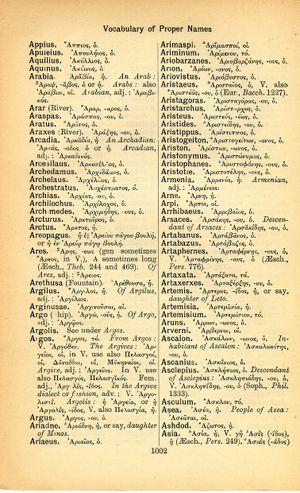Artemisia
οὐ δικαίως θάνατον ἔχθουσιν βροτοί, ὅσπερ μέγιστον ῥῦμα τῶν πολλῶν κακῶν → unjustly men hate death, which is the greatest defence against their many ills | men are not right in hating death, which is the greatest succour from our many ills
English > Greek (Woodhouse)
Ἀρτεμισία, ἡ.
Latin > English (Lewis & Short)
Artĕmĭsĭa: ae, f., = Ἄρτεμισία.
I Wife of King Mausolus, in Caria, to whom, after his death, she built the renowned Mausoleum, Gell. 10, 18.—
II artĕmĭsĭa, ae, f., the plant mugwort, Plin. 25, 7, 36, § 73; App. Herb. 10.
Latin > French (Gaffiot 2016)
(2) Artĕmīsĭa, æ, f.,
1 Artémise [femme de Mausole, reine de Carie] : Cic. Tusc. 3, 75 ; Gell. 10, 18, 1
2 île de la mer Tyrrhénienne : Plin. 3, 81.
Latin > German (Georges)
(1) Artemīsia1, ae, f. (Ἀρτεμισία), Königin in Karien, die ihrem Gemahl Mausolus ein prächtiges Grabmal errichtete, Gell. 10, 18, 3 sqq.; vgl. Cic. Tusc. 3, 75. Val. Max. 4, 6. ext. 1.

